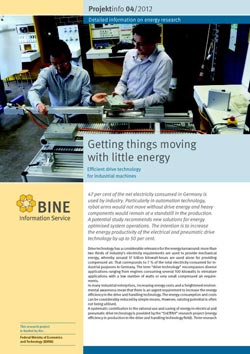Efficiently driving industrial machines

BINE-Projektinfo brochure “Getting things moving with little energy” (04/2012)<br>
In automation technology, every conveyor belt and robot arm requires drive energy. Without this and comparable systems, in particular the heavy components would remain at a standstill in the production.
If the efficiency of electrical and pneumatic drive technology could be increased, the electricity requirements of industry would drop. The latest BINE-Projektinfo brochure, “Getting things moving with little energy” (04/2012), presents a potential study on energy efficient automation. In a joint project, three research institutes and three industrial companies have systematically researched and assessed the possibilities.
The study focuses on drive technologies that use compressed air or electricity as energy sources and utilise these for handling tasks in robotics. The advantages and disadvantages of the two energy sources are compared for different tasks. Particularly with compressed air, simple measures such as continual monitoring and the rapid elimination of leakages can considerably reduce the energy costs.
An overview of efficiency-enhancing measures for pneumatic systems therefore provides a new approach to the investigations. Together with optimised, electrically driven technologies, it is systematically shown how production processes can be made more energy efficient. The researchers conclude by naming their efficiency favourites.
Industry uses approximately 47% of the net electricity consumed in Germany, whereby seven per cent of the electricity consumed in Germany is used just for generating compressed air. The term “drive technology” encompasses diverse applications, ranging from motors that consume several hundred kilowatts of electricity to miniature applications.
Press contact
Uwe Milles
presse(at)bine.info
About BINE Information Service
Energy research for practical applications
The BINE Information Service reports on energy research topics, such as new materials, systems and components, as well as innovative concepts and methods. The knowledge gained is incorporated into the implementation of new technologies in practice, because first-rate information provides a basis for pioneering decisions, whether in the planning of energy-optimised buildings, increasing the efficiency of industrial processes, or integrating renewable energy sources into existing systems.
About FIZ Karlsruhe
FIZ Karlsruhe – Leibniz Institute for Information Infrastructure is a not-for-profit organization with the public mission to make sci-tech information from all over the world publicly available and to provide related services in order to support the national and international transfer of knowledge and the promotion of innovation.
Our business areas:
• STN International – the world’s leading online service for research and patent information in science and technology
• KnowEsis – innovative eScience solutions to support the process of research in all its stages, and throughout all scientific disciplines
• Databases and Information Services – Databases and science portals in mathematics, computer science, crystallography, chemistry, and energy technology
FIZ Karlsruhe is a member of the Leibniz Association (WGL) which consists of 87 German research and infrastructure institutions.
Media Contact
More Information:
http://www.bine.info/enAll latest news from the category: Studies and Analyses
innovations-report maintains a wealth of in-depth studies and analyses from a variety of subject areas including business and finance, medicine and pharmacology, ecology and the environment, energy, communications and media, transportation, work, family and leisure.
Newest articles

Innovative 3D printed scaffolds offer new hope for bone healing
Researchers at the Institute for Bioengineering of Catalonia have developed novel 3D printed PLA-CaP scaffolds that promote blood vessel formation, ensuring better healing and regeneration of bone tissue. Bone is…

The surprising role of gut infection in Alzheimer’s disease
ASU- and Banner Alzheimer’s Institute-led study implicates link between a common virus and the disease, which travels from the gut to the brain and may be a target for antiviral…

Molecular gardening: New enzymes discovered for protein modification pruning
How deubiquitinases USP53 and USP54 cleave long polyubiquitin chains and how the former is linked to liver disease in children. Deubiquitinases (DUBs) are enzymes used by cells to trim protein…



